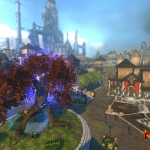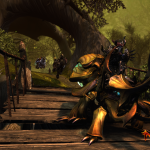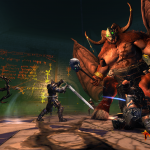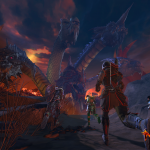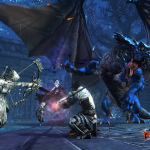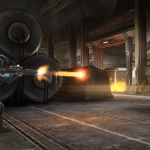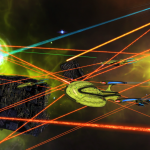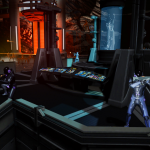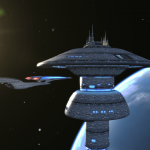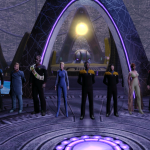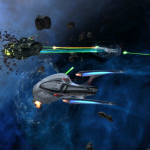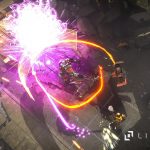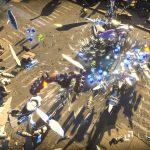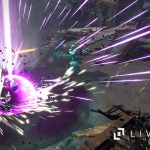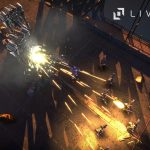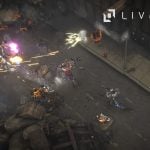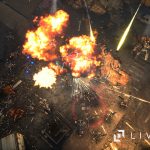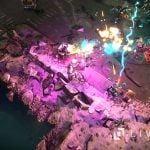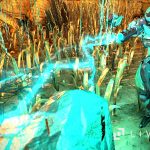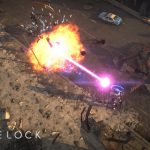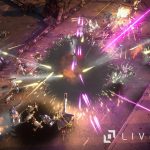
Cryptic’s Executive Producer, Rob Overmeyer, stressed that players are never are forced to buy anything in Neverwinter and that the game’s pricing is constantly being evaluated. STO’s team actually communicates its strategies quite frequently with the Neverwinter team; lockboxes, PWE says, allow that team to release in-demand content that players might want, but the designers have to be much more wary about unintentionally breaking immersion. Imagine playing a WWII MMO that suddenly gives players the option to grind out UFOs. It’s fun, but if it’s attached to a dungeon, grind reward, or other reliable method, you might see a flood of UFOs suddenly.
Livelock is using a very good business model that non-fans of the company may appreciate: buy-to-play. For $20, you get a singleplayer game with a campaign that your friends or match-made strangers can play with you. There aren’t any updates or current plans for DLC, but it’s something that could happen. There are no in-game power-ups or skins to buy, either; you just play. It sounds quite fair, and I have to admit that if more games used a similar model (especially with a bonus for multiple copies as Livelock will have), I’d probably be much poorer. It gives me hope that MOBA Gigantic (which PWE is publishing) might be in good hands after all.
The great console port of 2016
I also asked PWE about Xbox’s recently announced “Xbox Play Anywhere” platform, a system where players can buy a game on, say, Windows 10, and get it for free on Xbox One while allowing progress to carry over between platforms. While nothing’s confirmed yet, Perfect World is at least looking into the option for both its console MMOs. No clue what, if anything, it may mean for Gigantic, as it wasn’t being discussed this year, but hopefully the option is being explored.
Most of this year’s console news had to do with prepping for the console ports themselves. Neverwinter‘s already done it once — to Xbox One — so not much needed to be added for the PS4 port. STO, however, is apparently a much larger undertaking due to the many, many buttons STO players have mapped out. This has been solved for console players with a mix of radial menus and simple auto-macros (like having emergency heals automatically kick in at 50% health). This actually makes the game more accessible in general and may eventually also move to the PC version of the game. The UI also received a more console-friendly update — one so well done that I would have never have guessed the game was originally a PC title. PWE says it knows UIs are often a problem with ports and paid particular attention to this one during development, and at least during my hands-on time with the game, it felt like it paid off.
However, both titles will lack Foundry options. Neverwinter may have some top-rated player made content moved over for console players, but that’s all. STO currently won’t see it due to technical issues.
Bodly crossing streams
Eliot’s little theory about STO crossovers feels all but confirmed for me at this point. When I brought it up during my interview, there were a lot of laughs, smiles, and secrets barely being contained, but all I could get out of the devs is that they’re not afraid to “cross streams” as they assume all Trek fans love the franchise just as people at their office do, even if they have their own preferences. Don’t expect the recent movie universe to immediately invade, as the upcoming retro push demands their attention, but don’t be surprised if and when it happens.
Different kinds of giants
Neverwinter’s upcoming Storm King’s Thunder may share the same name as the Dungeons and Dragons expansion, but it’ll emphasize different playstyles. I was actually at the Meltdown Comics event for the release announcement of the new expansion, which talked about a big change for the giants’ hierarchy and what it means for the small folk, with emphasis on a way of making players big enough for the giants to take seriously. Overmeyer teased that there’s lots of literal and figurative ways for players to grow beyond just giant transformation potions, but the team’s not ready to discuss any details yet. However, the team apparently gets advanced warnings of upcoming D&D plans and is allowed to collaborate with the team.
I must admit, though, that it is all fairly combat-based. Despite the name, what always made D&D seem interesting to me as an outsider was that you could potentially tackle problems in non-violent but interesting ways. I spoke with D&D designers Mike Mearls and Chris Perkins at the Meltdown event earlier this month, and one thing we discussed was how the lack of a Dungeon Master rarely translated well into video games, especially for stuff like this. So while D&D is combat-based and Overmeyer said the team does look for times when non-combat options are appropriate, we shouldn’t expect any new emphasis on more open-ended experiences in near future.
That being said, the game just got guild alliances, partially because Overmeyer admitted to wanting easier access to off-hour parties (but don’t we all?). It’s a feature that not all players may have expected or appreciate, but as a former guild leader, I wish I’d seen it happen more often. The system’s young, but apparently it’s being used well enough by the community at the moment. At least for me, adding social systems always makes me feel like the game creators remember the original roots of the genre, and while it may have grown in places I can’t reach, there’s still some basic aspects I can appreciate.
More than meets the eye
Finally, there was some time for me to check in with Livelock, the Diablo-esque twin-stick shooter with robots. Eliot may not have had the best time with Vanguard, but I certainly did. Perhaps colored by his review, I admit that I could see Eliot’s complaints, but I just bash everything in these kinds of games, so debris and mini-minions alike aren’t safe around me. Perhaps partially due to the nature of the demo (which gave players slightly overpowered characters), it was easy enough to faceroll content up until we reached the boss. However, as the game revolves around the holy triade (there are only three characters, and each one fights a specific role that can be kitted to tackle that role in different ways but are never able to take over for another “class”), so we were equipped well enough to succeed. I’m not sure the game is for me, but if I were with a friend who wanted to sit down and play together, I’d probably suggest a second or third match after the first one.
As I mentioned before, the title will be fairly complete out of the box, which is a good place to be for online PC games these days, and the dev team behind it, Tuque, has shown laser-like focus on bringing out a quality product rather than holding content back for an expansion. While I didn’t get to play with them specifically, I did get to see how flexible character roles can be. Add to those the fact that you can find visual customization options (including capes for the ‘bots) and the three base characters can both functionally and visually change enough for players to feel at least some connection with their avatars.

